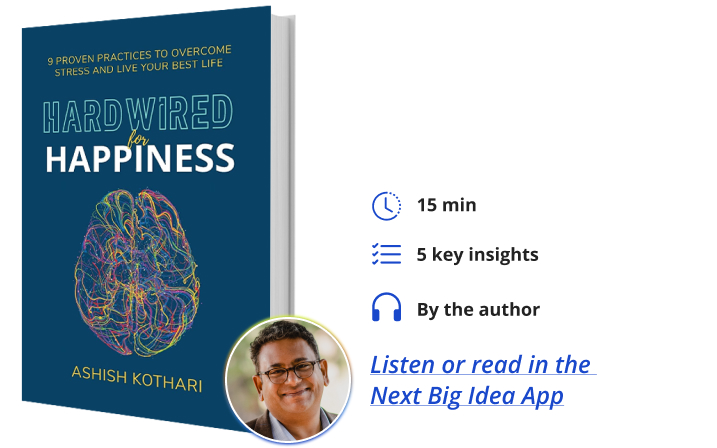Ashish Kothari is the Founder and CEO of Happiness Squad, a company launched in 2022 with the mission of helping people integrate the art and science of happiness into their lives. Previously, he spent 25 years in consulting, most recently as a partner at McKinsey & Company where he organized efforts in leadership, wellbeing, and resilience.
Below, Ashish shares five key insights from his new book, Hardwired for Happiness: 9 Proven Practices to Overcome Stress and Live Your Best Life. Listen to the audio version—read by Ashish himself—in the Next Big Idea App.

1. Our brains are maladapted to the modern world, causing us to struggle under the weight of our own prosperity.
Consider these four paradoxes of our time:
- We are more prosperous than any prior generation, with current poverty levels at less than 10 percent versus nearly 60 percent in the 1950s. Yet, we are more stressed and consume more, rather than being more satisfied or joyful.
- We are living longer than ever before, but our final years are filled with suffering from chronic ailments that are often lifestyle-related.
- Despite being more connected, we have never been lonelier.
- We have gained efficiency in everything we do (from booking flights, bank transactions, collaborating globally, etc.), but we are busier than ever, taking less vacation time, and feeling forced to be continuously on.
These paradoxes are a direct result of our brains being maladapted to the world we live in. Our brains are neurobiologically wired to look for danger and stay alive, not necessarily to keep us content and joyful. In the wild, our ability to sense a saber-toothed tiger hiding in the shadows and react with lightning speed decided life or death. It was fight or flight survival.
Today, dangerous predators have been replaced by an increasingly complex modern existence: balancing demanding careers with busy family life, while absorbing the 24/7 stream of stressful headlines. Our brains have a hard time separating physical threats from those to our fragile egos and still react in the same way every time we are triggered: fight or flight. As a result, we find ourselves living in a heightened state of psychological scarcity and fear—a fear of not being smart or successful enough, a fear of being left behind, or a fear of not being loved. Every day, we are becoming more hardwired for fear.
2. Rewiring our brains away from fear and towards happiness and resilience.
Our brains are neuroplastic. With practice, we can rewire our minds away from fear, towards love; from scarcity, to abundance; from “me” thinking, to “we” thinking. Nine research-backed practices from wisdom traditions help us master our inner tendencies to thrive in the modern world. These are the practices of self-awareness, purpose, mindfulness, gratitude, emotional mastery, kindness and compassion, holistic well-being, community, and living intentionally.
“Our brains have a hard time separating physical threats from those to our fragile egos.”
With time and repetition, each practice has the power to re-sculpt our neural pathways and change how we experience the outside world. For example, through mindfulness, the amygdala section of the brain (responsible for fright, flight, freeze responses) shrinks and our prefrontal cortex grows more grey matter.
Knowledge of the “what” and “how” is not sufficient. We need to practice what we know. We are drowning in knowledge but are parched for practice.
3. Habit formation can change the odds of success in your favor.
How many New Year’s resolutions have you started with gusto but quickly stopped attending to? Fewer than eight percent of people stick to their resolutions each year. Some of the most common reasons people don’t succeed include a lack of specificity on what actions to take, shooting for dramatic shifts right away, losing motivation, failing to anticipate obstacles, or lacking accountability.
To tip the scale in your favor, use the power of habit formation to make this your best year yet.
- First, be clear on your why and then ensure that every action towards the goal is small—ideally five minutes or less.
- Second, anchor the new action or behavior to something you already do every day. It is ideal to re-engineer an existing routine versus adding something new to an already busy life.
- Third, set up a system of accountability because that will significantly increase the chances of achieving a resolution. Even better, involve friends, family, or colleagues to rewire for happiness together.
4. A happier you begins with self-awareness.
We are all unique observers who are shaped by the broader cultural contexts in which we grew up: what we learned from parents, teachers, role models, and experiences. The practice of self-awareness can help you understand who you really are and move past fears that hold you back. By deepening awareness of your triggers and stressors, as well as habitual responses to them, you can learn how to pause, create space, and then choose a conscious response—not driven out of fear. In this way, you can move from surviving to thriving.
“Hardwiring for happiness begins with self-awareness.”
Self-awareness is a requirement before you can tap into the power of the other eight practices. Start by looking within and find the path to a meaningful life by integrating what you love and what you are good at with what the world needs and is willing to pay for. Gratitude requires an awareness of all the gifts and blessings in your life. Mindfulness requires awareness of where attention is placed: on the past, future, or present. Overcoming anger or fear requires looking deeply and honestly within to decide if the biggest hurdle in the path forward is not external, but rather your mindset might be the obstacle. Hardwiring for happiness begins with self-awareness.
5. Find a North Star to guide your journey.
In the hustle and bustle of our daily lives, we lose track of what truly matters. We make an unconscious over-investment in our careers and the pursuit of more and rely on regular withdrawals from tangible returns in the short term. Keeping what truly matters front and center and allocating time and energy accordingly is critical to living in coherence and harmony with your dreams.
The only constant in life is change. The best-laid plans and intentions get hampered by the deluge of constantly changing demands and life circumstances. Adopting a daily intention practice can provide the needed focus, discipline, and self-control for picking yourself up from every fall to persevere toward your goals. Setting daily intentions guides the battle between choices that provide instant gratification versus those that nurture the long-term benefits of achieving your goals.
To listen to the audio version read by author Ashish Kothari, download the Next Big Idea App today:
































